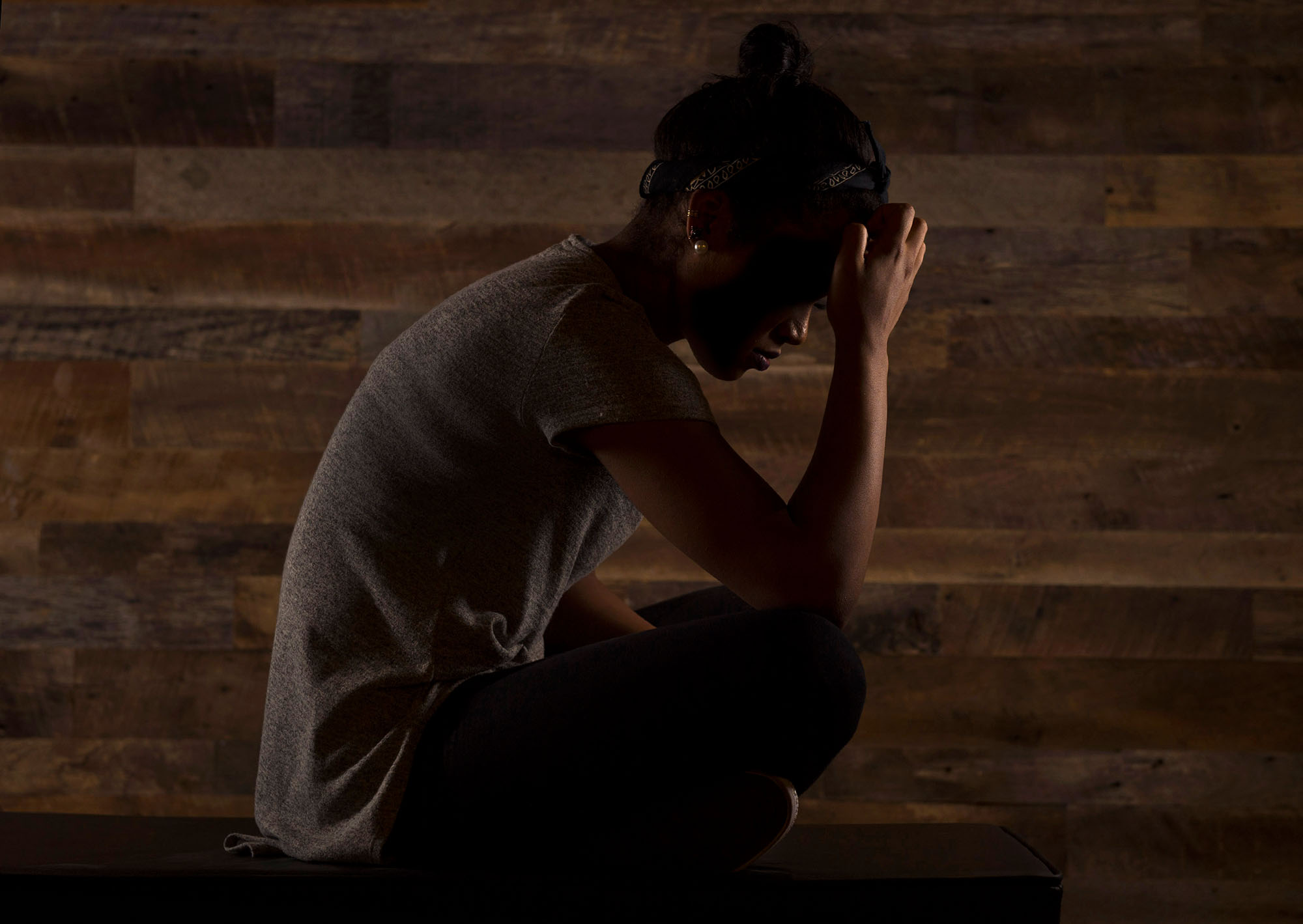Price • On the first Friday of fall semester at Utah State University Eastern last year, Sofia woke up with cuts and bruises, wearing a USU Eastern basketball T-shirt that wasn’t hers.
The last thing the sophomore could remember from the night before, she says, was standing in the doorway of a room in a red-brick dormitory across campus where a party was being held. What had happened in between, she knew only from others.
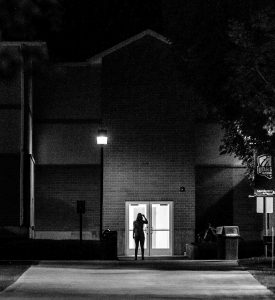
Utah State University Eastern, dormitory
Photos and videos of her passed out, her head in a trash can, were making the rounds on social media. A female student — the one who’d first shared the photos on Snapchat — told Sofia the two of them had a physical fight. Sofia’s missing clothes had been thrown in the garbage at the dorm where the party was held; a friend went to retrieve them.
Then a school counselor knocked on her door to tell her he’d heard she might have been sexually assaulted by three basketball players.
The counselor encouraged Sofia to go to a hospital and accompanied her there, but he also went to basketball practice to tell the coach about the assault allegations and who was involved. That, coupled with a “code blue” emergency alert sent to the school’s 1,500 students warning that an assault had been reported on campus, ratcheted the buzz about the party into a roar.
Even as campus police interviewed Sofia for the first time, the community was making up its mind about what had happened and rushing to defend the accused. Texts flew back and forth between students who’d been at the party.
“U think anybody would rape [her] she don’t look that good.”
“Make her a– take a polygraph.”
“She probably did some other s— to herself … to make it more believable. When I see her she had no bruises.”
The Salt Lake Tribune generally does not name sexual assault victims. Sofia asked to be identified by a pseudonym.
Today, she has dropped out of school and works at a call center. She lives with her parents. When she gets home, she walks to her room and closes the door. She has asked her mom to sleep beside her, or goes to bed with a light on. Sometimes, she wakes up shaking.
And though Carbon County prosecutors haven’t dropped the case, they haven’t brought any charges, saying they are still trying to make sense of the many accounts of that night.
The facts of the case seem to come down to something experts say still too few people fully understand: The definition of consent.
All Sofia knows, she says: “I don’t remember anything. Clearly I was not capable of saying yes or no.”
‘Falling down’
Students had gathered at Sessions Hall late on the night of Sept. 3, 2015. Some students were watching a movie. Others were making s’mores at a fire pit outside. Someone had purchased a bottle of Hennessy; people were mixing it with cola.
And, according to what they later told police, three men had sexual encounters with Sofia in a dorm room on the building’s second floor.
In the 64-page investigative report compiled by police, the three men also recalled that she was drunk — “to the point of vomiting and falling down,” one said.
So did witnesses.
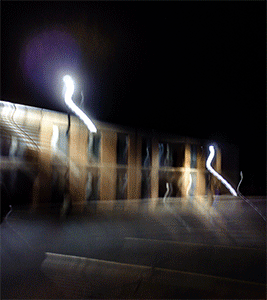
Sessions Hall
“Way drunk,” was how one student put it. “… [H]er balance was poor at best and [she] wasn’t making verbal sense.”
Sofia says that based on what she does remember, she didn’t drink enough alcohol to become drunk to the level described in the police report, or to the point where the entire night would be gone from her memory.
One player, who described Sofia as being “sloppy drunk,” invited her into his room. A female acquaintance was there, too — and two men, hiding in closets.
The woman suggested Sofia drink more and encouraged her to remove her shirt, according to the police report. The female acquaintance eventually left, leaving Sofia alone with the three players.
Two of the men later told police — after initially denying they’d had any sexual contact with Sofia — that she performed oral sex on them.
One man remained in a closet. He told police he’d come to the room for “one more shot to hook up with a girl” after a night of striking out.
He changed his statement multiple times during the police investigation, but ultimately said he heard Sofia say “Hell no” and “I don’t want to do this” to his teammates.
He believed he had witnessed a sexual assault, he told police. But he stayed in the closet, saying nothing. And after he at last came out and was alone in the bedroom with Sofia, he told police, she kissed him and he performed sex acts that he said were consensual.
A witness interviewed by police came into the room and saw this third man with Sofia, who was “passed out on the floor with her shirt off,” her pants pulled slightly down. She had “obviously puked on the floor,” the witness said.
Some students took Sofia downstairs to a friend’s dorm room.
As the night wore on, the three players and several other male students talked and teased one another about what had happened, according to the police report. Sofia threw up again. The female acquaintance who had left her alone with the three players captured cellphone photos and video of her “rolling around in vomit” and being sick in a garbage can, according to the police report. She told police she became upset with Sofia’s behavior and tried to physically remove her from the dorm. They fought.
One of the players — the one who had hidden in a closet the longest — helped drag Sofia across campus to her dorm, the walk taking them past the police station.
When he returned to the party, he later told police, a student was talking about what might happen if Sofia reported a rape.
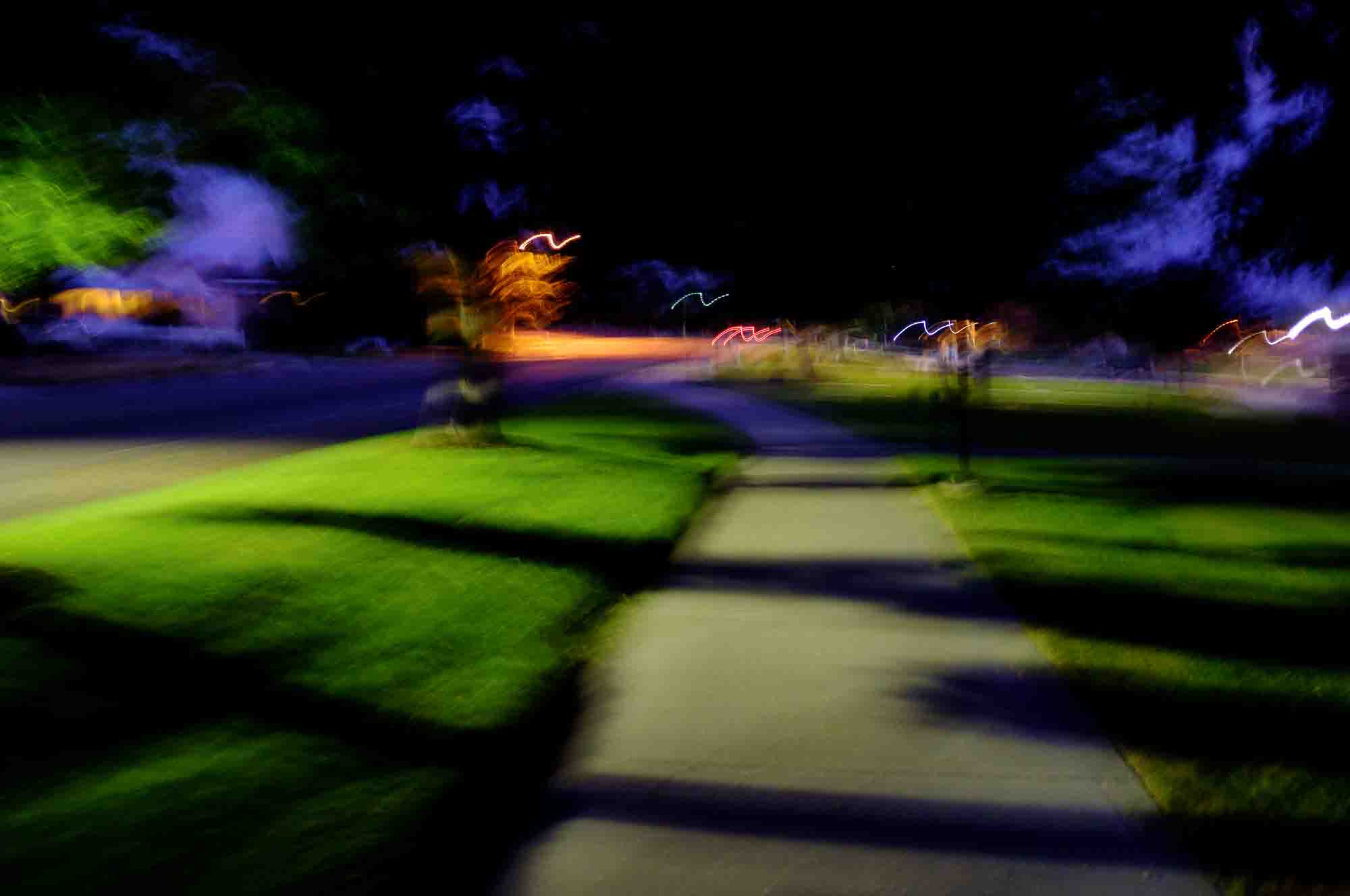
At night, a campus walkway
‘Control over your own body’
For some college-age men, “sex has become a blood sport,” says Jodi Petersen, a sexual-assault support advocate with the University of Utah’s Center for Student Wellness. Their goal when throwing parties and pouring drinks is to “get laid,” she says.
Both men and women often enter college, she says, without an understanding of healthy sex — which hinges on consent.
Victims who feel shaken after a sexual encounter they didn’t agree to may not realize it was an assault under the law, experts say.
And people may not see a problem with a sexual encounter if a person wasn’t screaming no, Petersen says. The “no means no” idea of consent is an imperfect one, she says; she’d like to see a concept closer to “Yes means hell yes.”
Consent also “needs to be ongoing,” Petersen says. Many young adults don’t understand that people can agree to one thing — kissing, touching — without consenting to every kind of sexual contact going forward.
“Giving consent on one occasion doesn’t mean that the person has written a blank check for all future occasions,” she says.
And drunk people can’t give consent, she says.
“When you’re to the point that you’re vomiting … you no longer have control over your own body,” she says. “And neither should anybody else.”
Utah’s criminal code was amended in 2015 to clarify that if a person knows that someone else is “unconscious or unaware” or “incapable of understanding or resisting,” having sex with the incapacitated person is rape.
For Kristen Houser, the chief public affairs officer for the National Sexual Violence Resource Center, there’s no question “that something very problematic happened” that night in Price.
“If you have a buzz,” she says, “you’re not allowed to sign legal documents.”
But prosecutor Jeremy Humes, whose office is weighing whether to move forward with Sofia’s case, told The Tribune he has concerns.
“It’s particularly difficult where she doesn’t remember what happened and then you’ve got conflicting statements between the people who do remember what happened,” he says. “You’ve got credibility issues. Which version of events do you believe? That makes it particularly challenging.”
Prosecutors can overcome those challenges with the right focus, the National District Attorneys Association says.
The key: Being clear on the difference between drunken sex between consenting people and a predator finding an easy target.
A 2007 study from the group recommended that prosecutors avoid parsing he-said, she-said conflicts and instead show that a sexual assault occurred because the victim was incapacitated and could not consent to sex.
There’s no universal blood-alcohol limit for consenting, as there is for being considered too drunk to drive, so prosecutors must focus on other indicators of incapacitation — such as vomiting, not being able to speak coherently and needing help to walk, all described by witnesses who saw Sofia that night.
When arguing before a jury, prosecutors must “overcome the tendency to focus on and blame the victim,” the study says, and instead — as is the norm in most criminal cases — “re-direct the focus back to the offender’s actions.”
“A victim who becomes voluntarily intoxicated does not do so with the expectation that she will be sexually assaulted,” the study says.
Predators don’t have to use weapons or physical force to overcome a victim who’s been drinking, the study noted, recommending prosecutors look for examples of emotional force — “deception, manipulation, planning, premeditation” to control the victim.
It’s a red flag for Petersen that men were hiding in closets in the Price dorm room.
“If those people had to hide, there’s a reason for that,” she says. “They suspected she wasn’t going to be down with that.”
Sofia says other students told her, “ ‘I’m so sorry it happened to you, but why would you go over there? Everybody knows how the basketball players are.’
“Just because I was over there,” she says, “doesn’t give them the right to do whatever they want.”
‘God will make you pay’
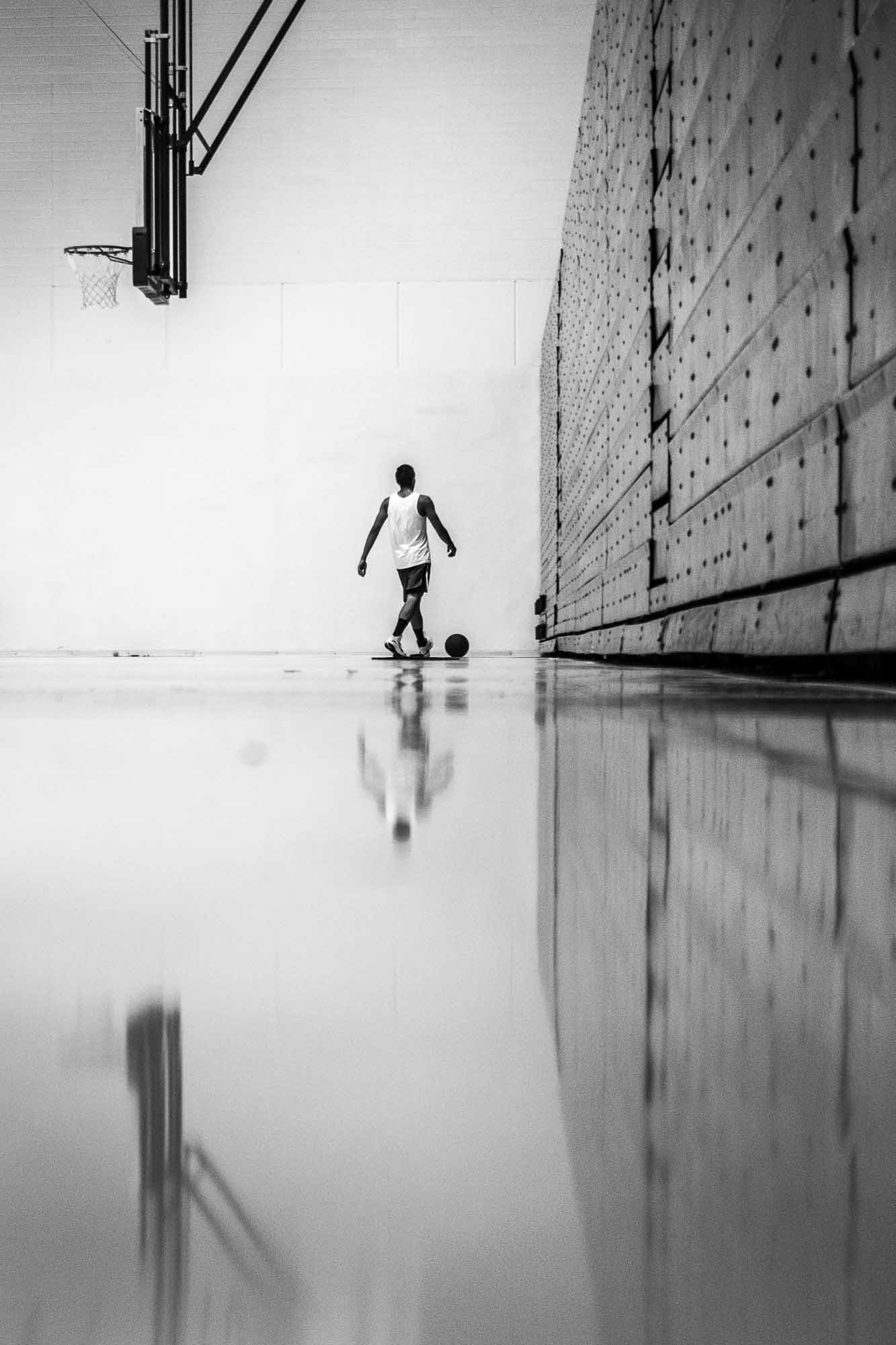
The basketball gym at USU Eastern
A week after the alleged assaults, USU Eastern Chancellor Joe Peterson suspended the entire men’s basketball team.
He told players there would be no practices and no games until they all gave statements to police, according to USU spokesman Tim Vitale.
The suspension, which lasted for about three weeks before it was lifted for all players except two, motivated more than just team members to speak with police.
USU Eastern basketball coach Vando Becheli accompanied two of his players and later two other students as they told police, among other things, what they’d heard about Sofia’s sexual history.
Another player secretly recorded a conversation with Sofia that he played for police — again with Becheli present — apparently viewing it as evidence that his teammates had been falsely accused. In the recording, according to the police report, Sofia told the student she didn’t remember anything about what the three men did that night.
Becheli did not return phone calls seeking comment.
Police also accessed a video — recorded hours after the assaults were reported — that included audio of the female acquaintance talking to one of the accused men, saying they could use the fact that Sofia couldn’t remember anything “against her.”
For Sofia, the campus became a nightmare.
“There were people who were on the basketball team’s side,” Sofia’s roommate says. “They were mad at us, mostly [her], but me as well because I was always with her. They were upset with us that we did something that would cause them to get in trouble, which, I think, is bulls—.”
And on such a small campus, running into one of the men was not only a possibility but a likelihood. Sofia says she was harassed in the cafeteria. When she saw the men she’d been told assaulted her coming toward her on campus, she turned and ran.
One day about a week after the party, the rattled sophomore was walking alone near the soccer field when she heard a voice behind her.
“I am not a f—— rapist, you little b—-,” one of the men involved said, according to the police report.
That same day, she would get a series of text messages from another of the men — whom she’d dated the year before — that shook her, too. Among them: “… God will make you pay for this and I know because I’m Gid[sic] fearing and he’s on my side … how is it that last year u did the same exact thing multiple nights and now somebody rapped[sic] u …”
That man later spoke to The Tribune and says Sofia wasn’t drunk that night, despite his comments to police, and says she was able to have a conversation with him. “I went to sleep [that night] thinking there wasn’t nothing wrong,” he says.
“I was shocked when they told me the allegations, that it was a sexual assault.”
‘We kind of all ignored it before’
Two weeks after the alleged assaults, Sofia had not registered for fall classes and was at risk of losing her spot in the dorms.
She stopped returning officers’ calls, frustrated by her lack of memories, paralyzed by the helplessness she felt and by the response from her fellow students.
Under a federal law called Title IX, schools must address sex assault by not only disciplining offenders but also protecting victims and eliminating the “hostile environment” created in the aftermath of an attack. A student who may have been the victim of a sexual assault is entitled to immediate services, such as housing changes and class adjustments or more lenient deadlines.
Sofia says she met with a Title IX counselor once or twice, but they quickly fell out of touch.
In late September, the basketball team suspension was lifted, and the completed police report was sent to Carbon County prosecutors and to the Title IX official at USU’s main campus, 200 miles away in Logan.
The school counselor was suspended by the university after the public release of the report, which said the Carbon County Sheriff’s Office had told USU’s Peterson that the counselor “caused a safety risk to all parties” by disclosing information on the alleged assaults to the entire basketball team prior to police involvement. The counselor later resigned.
Sofia withdrew from school midsemester for fear of running into her attackers.
The accused student who spoke to The Tribune says he and his two teammates were kicked out of the dorms and told they could return to play basketball for the 2016-17 season — if they completed community service, wrote a letter of apology and watched a tape about student conduct.
It didn’t seem as though school officials thought he and his teammates were responsible for sexually assaulting anyone, he says.
“If you feel like somebody really raped someone, why would they give us a chance to come back?” he says.
USU Eastern Vice Chancellor Greg Dart says that the initial Title IX recommendation was to expel the three men. All three appealed that decision to a school panel, which determined the students should be suspended for a time with the possibility of full reinstatement.
During that time, one student left the school. The two others were “involved in vandalism” — a violation of their terms — and were subsequently expelled.
The student The Tribune spoke to says he returned to his hometown after fall semester, feeling “traumatized” and “depressed.” He is now attending community college and hoping for another chance to play at a higher level, but he’s still worried.
“I’m just scared thinking they’re going to call me one day saying I’ve got to be at court,” he says.
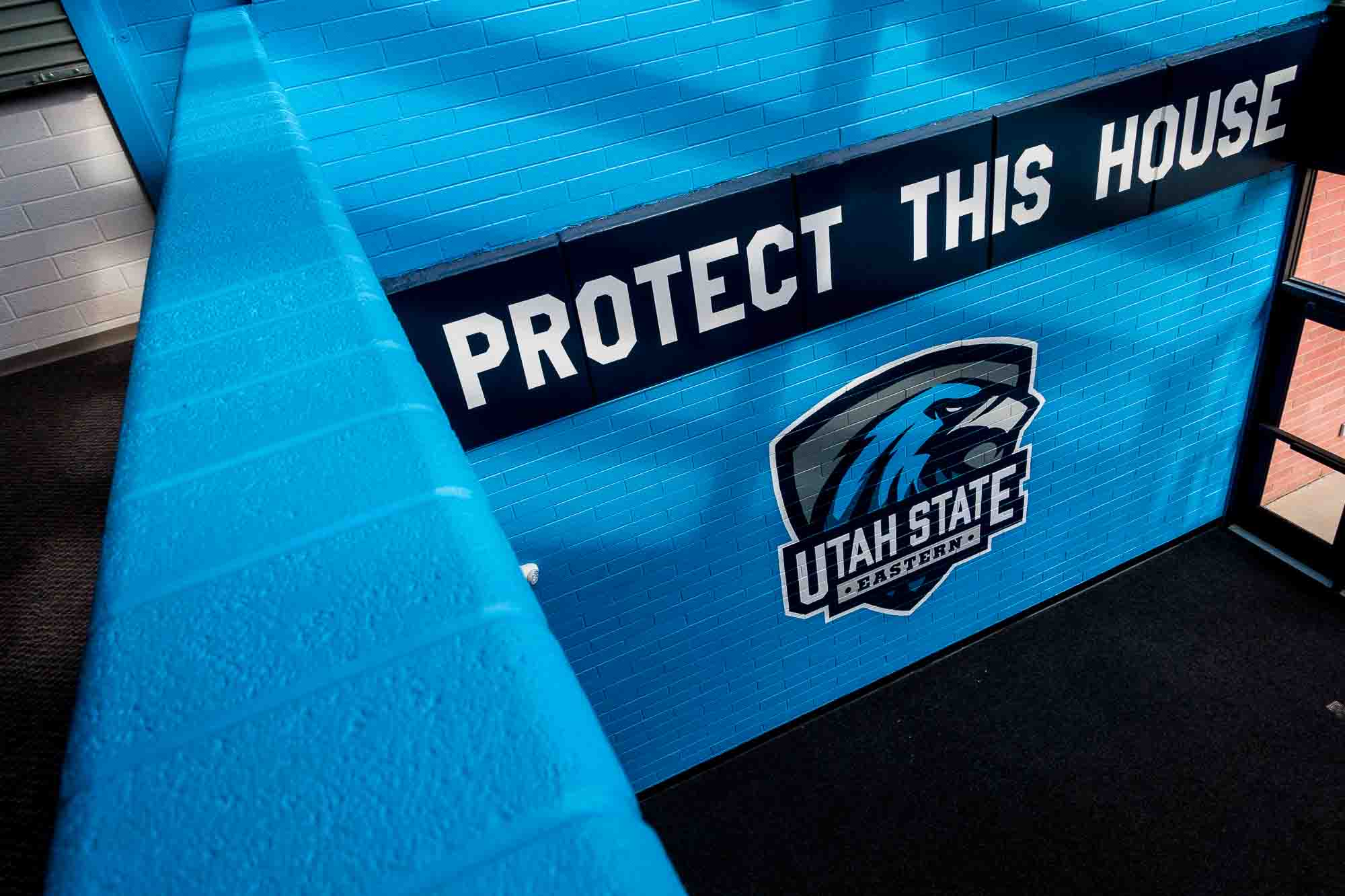
The Bunnell-Dmitrich Athletic Center
For sophomore social work student Tomi Lasley and other students, the September night and its fallout changed how they saw their school.
“The incident brought about an awareness of a big problem on campus,” she says. “We kind of all ignored it before. Then it happened and it was real.”
Lasley and others pushed for the school to show a documentary about campus sexual assault. She helped bring experts to town to provide a 40-hour course in victim advocacy, and has worked to assemble a sexual assault response team for the county.
And she started to receive messages — more and more — on Facebook.
“I’ve had about 12 girls who have come to me since January,” she says. All of them have stories of sexual assault, though she says none has been willing to speak with the school or police. “I’m just advocating for them the best way I can and trying to convince them to seek medical treatment.”
Dart says there was more discussion among students about sexual violence last year than he’d ever seen in his years in higher education.
“We’ve tried to harness that energy and that desire to learn more,” he says, by increasing prevention programming.
Most incoming students have not considered the realities of sexual assault — the role that consent plays, and that a perpetrator is more likely to be someone you know than a stranger jumping out of the bushes, he says.
Yet 18- to 25-year-olds have the highest risk of experiencing sexual assault.
“We don’t want to scare anyone as they arrive on campus, but we want them to have a heightened awareness,” Dart says.

Sunset turns the clouds golden over the Jennifer Leavitt Student Center
As fall classes again get underway, faculty and staff, as well as student athletes and student leaders, have gone through a training program called Step Up, which focuses on consent and bystander intervention.
“The only way to prevent sexual violence is to get in front of the would-be perpetrators,” Dart says. “Is someone really in a place where they can consent? It’s not just no means no, but yes means yes.”
Meanwhile, no charges have been filed in Sofia’s case, which remains open.
Prosecutors are still waiting for the rape kit to be processed, Humes says. Carbon County has received the results of a toxicology report showing Sofia’s blood-alcohol level and whether any other substances may have contributed to her impairment, but Humes says he could not share the findings.
“We try to look at everything as best we can and, in the end, we’re in the proof business,” Humes says. “What can we prove beyond a reasonable doubt? That’s what makes some of these difficult. We certainly feel for the victims. It may not be a question of what happened in our minds, but proving beyond a reasonable doubt may be a different story.”
Months away from that night and miles away from USU Eastern, Sofia has battled depression. She has grown frustrated with the legal system. And she is angry, she says, that she felt like she had to leave school.
“I don’t really have any hope that anything is going to happen, to be honest,” she says.
Her mother remains hopeful that they can still find what she regards as justice.
“We’re not going to let this go. This is a societal war. Not just mine. Not just my daughter’s.”
afalk@sltrib.com
Twitter: @aaronfalk

